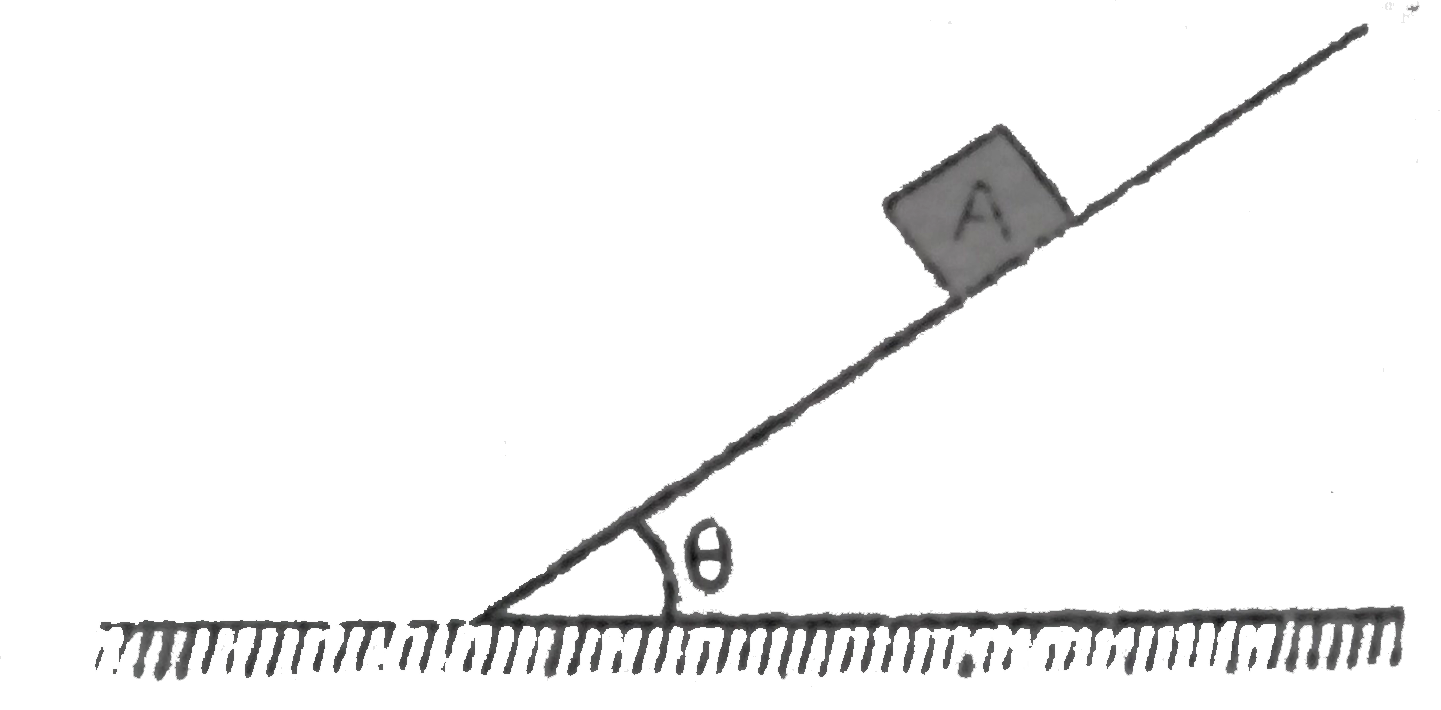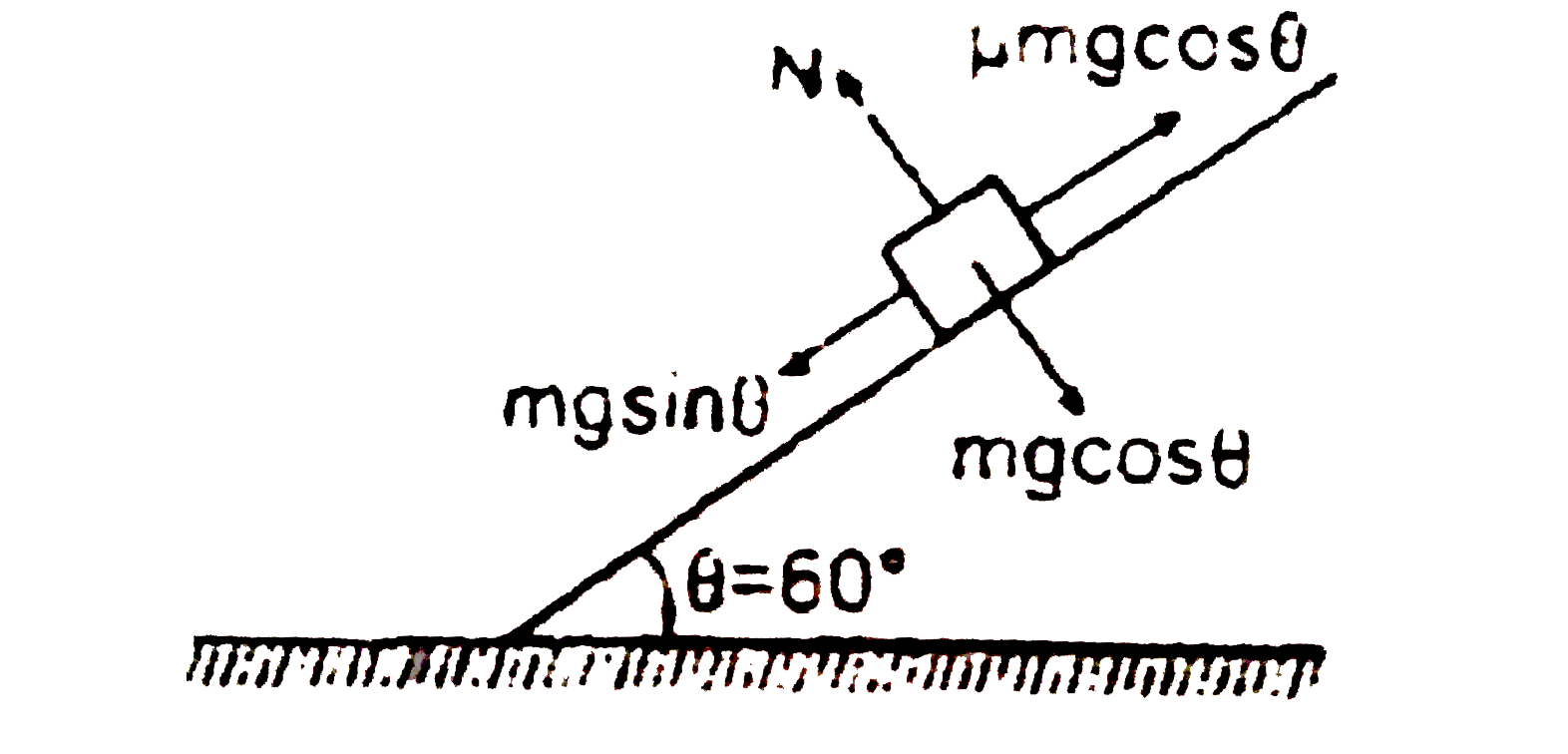A block A is kept on a rough inclined plane. Initially θ=0. The co-efficient of kinetic friction between A and the inclined plane is √3 The angle θ is increased slowly. When θ becomes 60∘, then :

A slides down with constant velocity
A does not slide
A slides down with constant non-zero acceleration
A slides down with constant acceleration
The correct Answer is:B
At θ=60∘
mgsinθ=μmgcosθ

∴ Net force on the block is zero. Since initially block was at rest relative to inclined plane, it continues to remain in rest.
Topper's Solved these Questions
- BOOK - RESONANCECHAPTER - DAILY PRACTICE PROBLEMEXERCISE - DPP No.309videos
DAILY PRACTICE PROBLEM
- BOOK - RESONANCECHAPTER - DAILY PRACTICE PROBLEMEXERCISE - DPP No.3120videos
DAILY PRACTICE PROBLEM
- BOOK - RESONANCECHAPTER - DAILY PRACTICE PROBLEMEXERCISE - DPP No.289videos
DAILY PRACTICE PROBLEM
- BOOK - RESONANCECHAPTER - CURRENT ELECTRICITYEXERCISE - High Level Problems (HIP)21videos
CURRENT ELECTRICITY
- BOOK - RESONANCECHAPTER - ELECTRO MAGNETIC WAVESEXERCISE - Exercise 327videos
ELECTRO MAGNETIC WAVES
Similar Questions
Knowledge Check
- Question 1 - Select One
An ice cube is kept on an inclined plane of angle 30∘. The coefficient to kinetic friction between the block and incline plane is 1/√3. What is the acceleration of the block ?
AZeroB2m/s2C1.5m/s2D5m/s2 - Question 2 - Select One or More
A solid cylinder is rolling down a rough inclined plane of inclination θ. Then
AThe friction force is dissipativeBThe friction force is necessarily changingCThe friction force will aid rotation but hinder translationDThe friction force is reduced if θ is reduced - Question 3 - Select One or More
A solid cylinder of mass m and radius r is rolling on a rough inclined plane of inclination θ. The coefficient of friction between the cylinder and incline is μ. Then.
Africtional force is always μmgcosθBfriction is a dissipative forceCby decreasing θ, frictional force decreasesDfrictiona opposes translation and supports rotation.
A block of mass m moves with constant speed down the inclined plane of inclination θ. Find the coefficient of kinetic friction.
 View Solution
View Solution[" A block "A" of mass "m" is kept "],[" on a rough inclined plane of "],[" inclination "theta" .The coefficient "],[" of static friction between the "],[" block and the surface is "mu_(s)],[=0.75" .If the angle "theta" is "],[" slowly increased from "0^(@)" to "],[37^(@)" ,then the friction versus "theta],[" graph is "]
View SolutionA block of weight 1 N rests on a inclined plane of inclination θ with the horizontal. The coefficient of friction between the block and the inclined plane is μ. The minimum force that has to be applied parallel to the inclined plane to make the body just move up the plane is
View SolutionA block of mas m begins to slide down on an inclined plane of inclination θ. The force of friction will be
View SolutionA block rests on a rough inclined plane making an angle of 30° with the horizontal. The coefficient of static friction between the block and inclined plane is 0.8. If the frictional force on the block is 10 N, the mass of the block is
View Solution

